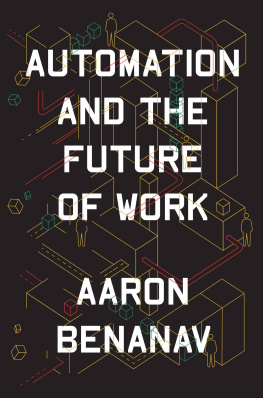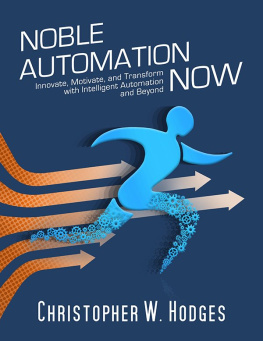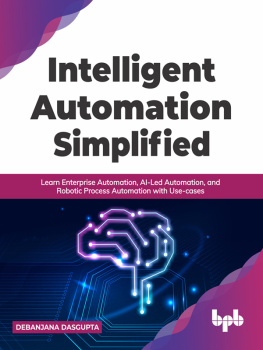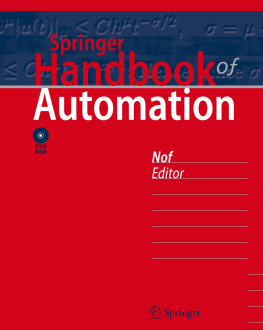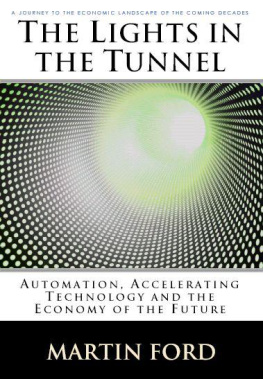Aaron Benanav - Automation and the Future of Work
Here you can read online Aaron Benanav - Automation and the Future of Work full text of the book (entire story) in english for free. Download pdf and epub, get meaning, cover and reviews about this ebook. publisher: Verso Books, genre: Politics. Description of the work, (preface) as well as reviews are available. Best literature library LitArk.com created for fans of good reading and offers a wide selection of genres:
Romance novel
Science fiction
Adventure
Detective
Science
History
Home and family
Prose
Art
Politics
Computer
Non-fiction
Religion
Business
Children
Humor
Choose a favorite category and find really read worthwhile books. Enjoy immersion in the world of imagination, feel the emotions of the characters or learn something new for yourself, make an fascinating discovery.
- Book:Automation and the Future of Work
- Author:
- Publisher:Verso Books
- Genre:
- Rating:3 / 5
- Favourites:Add to favourites
- Your mark:
- 60
- 1
- 2
- 3
- 4
- 5
Automation and the Future of Work: summary, description and annotation
We offer to read an annotation, description, summary or preface (depends on what the author of the book "Automation and the Future of Work" wrote himself). If you haven't found the necessary information about the book — write in the comments, we will try to find it.
Automation and the Future of Work — read online for free the complete book (whole text) full work
Below is the text of the book, divided by pages. System saving the place of the last page read, allows you to conveniently read the book "Automation and the Future of Work" online for free, without having to search again every time where you left off. Put a bookmark, and you can go to the page where you finished reading at any time.
Font size:
Interval:
Bookmark:

AUTOMATION AND THE FUTURE OF WORK
AUTOMATION AND THE
FUTURE OF WORK
Aaron Benanav

First published by Verso 2020
Aaron Benanav 2020
An earlier version of this text appeared as Automation and the Future of Work,
New Left Review, nos. 119, Sept.Oct. 2019 and 120, Nov.Dec. 2019.
All rights reserved
The moral rights of the author have been asserted
1 3 5 7 9 10 8 6 4 2
Verso
UK: 6 Meard Street, London W1F 0EG
US: 20 Jay Street, Suite 1010, Brooklyn, NY 11201
versobooks.com
Verso is the imprint of New Left Books
ISBN-13: 978-1-83976-129-4
ISBN-13: 978-1-83976-130-0 (UK EBK)
ISBN-13: 978-1-83976-131-7 (US EBK)
British Library Cataloguing in Publication Data
A catalogue record for this book is available from the British Library
Library of Congress Cataloging-in-Publication Data
A catalog record for this book is available from the Library of Congress
Typeset in Garamond by Hewer Text UK Ltd, Edinburgh
Printed and bound by CPI Group (UK) Ltd, Croydon CR0 4YY
Contents
T HE INTERNET, SMARTPHONES, AND social media have already transformed so much about the way we interact with each other and come to know the world. What would happen if these digital technologies moved off the screen and increasingly integrated themselves into the physical world around us? Advanced industrial robotics, self-driving cars and trucks, and intelligent cancer-screening machines appear to presage a world of ease, but they also make us uneasy. After all, what would human beings do in a largely automated future? Would we be able to adapt our institutions to realize the dream of human freedom that a new age of intelligent machines might make possible? Or would that dream turn out to be a nightmare of mass technological unemployment?
In two New Left Review articles published in 2019, I identified a new automation discourse propounded by liberal, right-wing, and left analysts alike. Asking just these sorts of questions, automation theorists arrive at a provocative conclusion: mass technological unemployment is coming and can be managed only by the provision of universal basic income, since large sections of the population will lose access to the wages they need to survive.
In this book, I argue that the resurgence of the automation discourse today is a response to a real trend unfolding across the world: there are simply too few jobs for too many people. This chronic labor underdemand is manifest in economic trends such as jobless recoveries, stagnant wages, and rampant job insecurity. It is visible as well in the political phenomena that rising inequality catalyzes: populism, plutocracy, and the rise of a new, sea-steading digital elitemore focused on escaping in rockets to Mars than on improving the livelihoods of the digital peasantry who will be left behind on a burning planet Earth.
Pointing with one hand to the homeless and jobless masses of Oakland, California, and with the other to the robots staffing the Tesla production plant just a few miles away in Fremont, it is easy to believe that the automation theorists must be right. However, the explanation they offerthat runaway technological change is destroying jobsis simply false. There is a real and persistent under-demand for labor in the United States and European Union, and even more so in countries such as South Africa, India, and Brazil, yet its cause is almost the opposite of the one identified by the automation theorists.
In reality, rates of labor-productivity growth are slowing down, not speeding up. That should have increased the demand for labor, except that the productivity slowdown was overshadowed by another, more eventful trend: in a development originally analyzed by Marxist economist Robert Brenner under the title of the long downturnand belatedly recognized by mainstream economists as secular stagnation or Japanificationeconomies have been growing at a progressively slower pace. The cause? Decades of industrial overcapacity killed the manufacturing growth engine, and no alternative to it has been found, least of all in the slow-growing, low-productivity activities that make up the bulk of the service sector.
As economic growth decelerates, rates of job creation slow, and it is this, not technology-induced job destruction, that has depressed the global demand for labor. Put on the reality-vision glasses of John Carpenters They Live, which allowed the protagonist of that film to see the truth in advertising, and it is easy to see a world not of shiny new automated factories and ping-pong-playing consumer robots, but of crumbling infrastructures, deindustrialized cities, harried nurses, and underpaid salespeople, as well as a massive stock of financialized capital with dwindling places to invest itself.
In an effort to revive stagnant economies, governments spent almost a half century imposing punishing austerity on their populations, underfunding schools, hospitals, public transportation networks, and welfare programs. At the same time, in a world of ultralow interest rates, governments, businesses, and households took on record quantities of debt. They did not do so to invest in our digital future, as former Federal Reserve chairman Alan Greenspan argued they would in the midst of the late-1990s tech bubble. Instead, firms mortgaged their assets to pay off shareholders, while poorer households borrowed in an effort to make ends meet.
These trends have left the world economy in an incredibly poor position as it faces one of its greatest challenges: the COVID-19 recession. Dilapidated healthcare systems have been overrun with patients, and schools have closed that were for many children vital sources of basic nutrition (and for parents, of much-needed child-care). Meanwhile, the economy is tanking. Heavily indebted companies watched their stock values plummet, at least initially, at rates not seen since the Great Depression. Unemployment rates rose significantly across the world, and stratospherically in the United States, leaving large parts of the population unable to pay for food, medical care, or housing. In spite of massive monetary and fiscal stimuli, weak economies are unlikely to bounce back quickly from the shock. It is easy to see how over the long term, the COVID-19 recession will accelerate what are by now long-unfolding trends of rising economic insecurity and inequality.
It is precisely for this reason that it is so important to reflect on todays automation discourse. Automation theorists offer a utopian reply to our dystopian world. Remove the They Live reality-vision glasses and return for a moment to the world of fantasy inhabited by these authors. In it, we all work less (like the victims of the present recession) yet have access to everything we need to make a life; we spend more time with our families (but not because we are in imposed isolation); the elderly jog through parks wearing new exoskeleton jumpsuits (rather than dying in hospital beds); and the air has been cleared of smog because we are transitioning rapidly to a world of renewable energy (rather than because factories have been shuttered and people are no longer driving cars). With the exception of the exoskeleton jumpsuits, all of this is possible now if we fight for it. We can already achieve the post-scarcity world that the automation theorists invoke, even if the automation of production proves impossible.
My interest in this topic arose from two distinct sources, one in the deeper past and the other more recent. Like many of the automation theorists, I grew up in the 1980s and 90s reading science fiction novels and watching the spacefaring communists of
Font size:
Interval:
Bookmark:
Similar books «Automation and the Future of Work»
Look at similar books to Automation and the Future of Work. We have selected literature similar in name and meaning in the hope of providing readers with more options to find new, interesting, not yet read works.
Discussion, reviews of the book Automation and the Future of Work and just readers' own opinions. Leave your comments, write what you think about the work, its meaning or the main characters. Specify what exactly you liked and what you didn't like, and why you think so.

